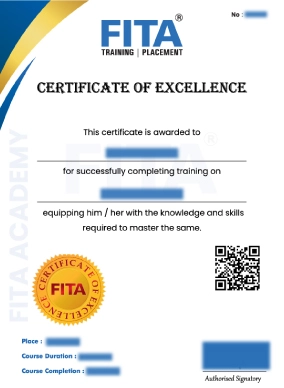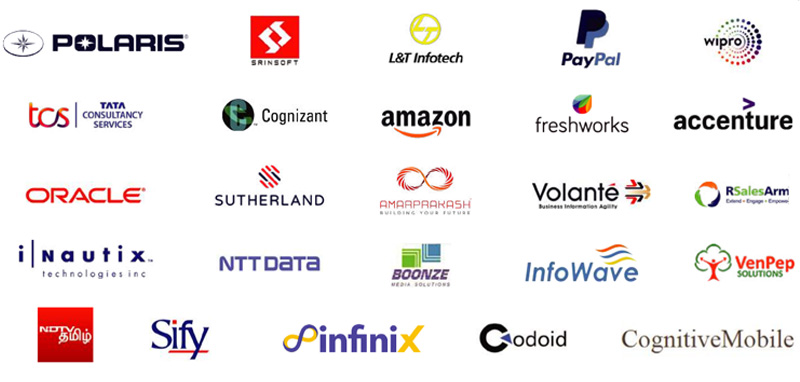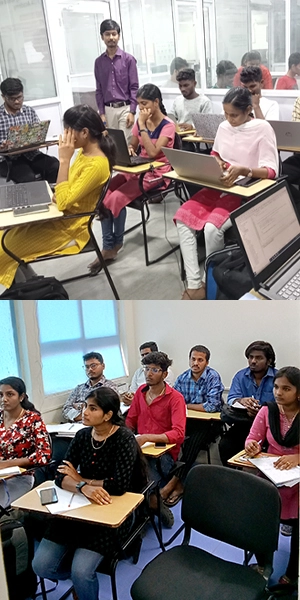Course Highlights and Why Hadoop Training In Bangalore at FITA Academy?
Upcoming Batches
- 17-04-2025
- Weekdays
- Thursday (Monday - Friday)
- 19-04-2025
- Weekend
- Saturday (Saturday - Sunday)
- 21-04-2025
- Weekdays
- Monday (Monday - Friday)
- 26-04-2025
- Weekend
- Saturday (Saturday - Sunday)
Classroom Training
- Get trained by Industry Experts via Classroom Training at any of the FITA branches near you
- Why Wait? Jump Start your Career by taking the Hadoop Training in Bangalore!
Instructor-Led Live Online Training
- Take-up Instructor-led Live Online Training. Get the Recorded Videos of each session.
- Travelling is a Constraint? Jump Start your Career by taking the Hadoop Online Training!
Syllabus
What is Big Data?
- Getting to know about Big Data
- The New 5V of Data - Variety, Veracity, Velocity, Value, and Volume
- Benefits of Big Data
- Restriction of Traditional System in Managing the Big Data
- Solutions to handle big Data - Hadoop
- Hadoop Vs Other Solutions
Introduction to Hadoop
- Getting to know Hadoop 2.x
- Hadoop Architecture
- Hadoop EcoSystem
- Getting to Know Hadoop
- Hadoop Components
- Key Features
- Different Distributions of Hadoop
Overview of Hadoop Configuration and Installation
- Pre-requisites
- Fundamentals of Linux Terminal Commands
- Configuration of Hadoop Files
- Environment Setting of Hadoop and Daemon-Properties, Ports
Hadoop HDFS
- Becoming Familiar with HDFS
- The architecture of the HDFS
- Master-Slave Architecture
- Name Node
- Data Node
- Configuration of HDFS
- The setting of Security and Permission
- Data Flow - File Write, File Read, and Coherence Model
- Kinds of Clusters
- Single Cluster Node
- Multi-Node Cluster
- Outline of the Cluster Size Specification
- Loading Techniques of Data
- Writing operations of HDFS
- Data Managing Integrity
Java and OOPS Fundamentals - MapReduce Framework
- The MapReduce Model
- MapReduce Architecture
- Concept of Reducers
- Concept of Mappers
- Map Stage
- Reduce Stage
- Shuffle Stage
- Data Types in the MapReduce
- Custom Data Types
- Practitioners
- Combiners
- Mappers
- Input Splits
- Custom Input
- Sequence Input
Yarn Framework
- Why use Yarn?
- Construction of YARN
- YARN Components
- Resource Manager
- Node Manager
- Container
- Application Master
- Schedules of Jobs in YARN
- FIFO Scheduler
- FAIR Scheduler
- Capacity Scheduler
- Submitting the Job in YARN
Hive Framework
- Why use Hive?
- Hive vs Pig
- Components and Architecture of Hive
- Functioning of the HiveQL
- Models and Data Types
- Managed Hive Tables
- External Tables
- Hive Bucketing and Partitions
- Importing Data
- Loading Data
- Querying Data - Joins, Query, Subqueries
- Query Optimizers
- Management of Outputs
- Hive Scripts
- User- Defined Functions that are used in the Hive
- Hive Metastore
- Views and Indexes
- Thrift Server
- Dynamic Partitioning
- Limitation of Hive
- Performing the Data Analysis using the Hive and Pig
HBASE
- NoSQL Databases
- Getting to know HBASE
- RDBMS vs HBASE
- HBase Architecture and Components
- Cluster Deployments
- Client APIs
- Data Modells
- Using the Shell in the HBASE
- Handling the Data in the HBASE
- Data Loading Techniques
- Filters
- Integration of MapReduce
- HIVE Integration
- HBase Integration
- Advanced Features
Pig Framework
- Getting to know PIG Framework
- Why use Pig and Hive
- Components of the PIG
- PIG Latin
- Structure of the Pig Scripts
- Data Types
- Data Models
- Defining the Schema
- Defining the Relation
- Data Viewing
- Choosing the Specific Columns
- Joins
- Specialized joins
- PIG Macros
- Order By
- Group BY
- Operators
- Built-in Functions
- Loading
- Storing
- PIG Streaming
- Testing PIG of the Latin Scripts
- PIG Modes - MapReduce Mode and Local Mode
- Execution of Pig Scripts
- Batch Mode
- Interactive Mode
- Embedded Mode
- User-defined functions
- The Grunt Shell
- Execution of Pig Scripts in different Modes
- Hive Integration
- PIG Integration
ZOOKEEPER Framework
- Need for Coordination of Services of the Distributed Applications
- Getting to know about the ZOOKEEPER Framework
- The Architecture of the ZOOKEEPER - Client, Leader, Server, Follower
- Handling the HBASE by using the ZOOKEEPER
- Data Services
- Data Model
- Data Loading Techniques
- Locking and Synchronization
- Configuration of Management
FLUME and SQOOP
- The ETL Using the SQOOP
- Benefits of SQOOP
- SQOOP Interpreter
- Importing Data from different sources
- Exporting of Data to different sources
- Handling the Streaming of Data
- Getting to know FLUME
- How to Use FLUME to manage the Huge Streaming Data
- Demo of SQOOP and FLUME
Workflow Management with OOZIE
- Workflow of OOZIE
- Components of OOZIE
- OOZIE Coordinator
- OOZIE Scheduler for Scheduling Jobs
- Commands
- Web Console
- OOZIE for MapReduce
- Handling the Flow of MapReduce Jobs
- Managing the Flow of Building and Managing the “Data Application Pipeline”
SCALA and Spark
- What is Spark
- Why use Spark
- Getting to know Spark and the Components
- Benefits of Spark
- Benefits of Using the Spark with HADOOP
- Getting to know SCALA Programming
- Benefits of SCALA Programming
Trainer Profile
- The Big Data Hadoop Trainers in Bangalore at FITA Academy provides the right combination of the conceptual and theoretical training of Big Data Course
- The Big Data Tutors in Bangalore at FITA Academy is delivered by Certified Big Data Professionals from the industry
- The Big Data Instructors at FITA Academy have worked on more than 25+ Real-time Big Data Projects
- The Big Data Hadoop Mentors at FITA Academy equips the students of the Big Data Hadoop course to prepare for the global certification exams namely – CCA Spark and Hadoop Developer [CCA – 175]
- The Big Data Trainers at FITA Academy provides holistic training of the important Big Data tools namely – Hadoop, Yarn, MapReduce, Pig, Hive, Zookeeper, Spark, and Scala
- The Big Data Tutors at FITA Academy provides the learners with the maximum practical exposure to Big Data technology and impart the technical skills that are required for professionals
- The Big Data Instructors at FITA Academy support the students of the training program in the Resume Building Process and give valuable insights into the Interview Process and Questions
Learn at FITA Academy & Get Your
Dream IT Job in 60 Days
like these Successful Students!
Features of Hadoop Training In Bangalore at FITA Academy
Real-Time Experts as Trainers
At FITA Academy, you will learn from industry experts eager to share their knowledge with learners. You will also get personally mentored by the Experts.
LIVE Project
Get the opportunity to work on real-time projects that will provide you with deep experience. Showcase your project experience and increase your chances of getting hired!
Certification
FITA Academy offers certification. Also, get ready to clear global certifications. 72% of FITA Academy students appear for global certifications and 100% of them clear it.
Affordable Fees
At FITA Academy, the course fee is not only affordable, but you can also pay it in installments. Quality training at an affordable price is our motto.
Flexibility
At FITA Academy, you get the ultimate flexibility. Classroom or online training? Early morning or late evening? Weekday or weekend? Regular Pace or Fast Track? - Choose whatever suits you best.
Placement Support
Tied-up & signed MOUs with over 3000+ small & medium-sized companies to support you with opportunities to kick-start & advance your career.
Why Learn Hadoop Training In Bangalore at FITA Academy?
Live Capstone Projects
Real time Industry Experts as Trainers
Placement Support till you get your Dream Job offer!
Free Interview Clearing Workshops
Free Resume Preparation & Aptitude Workshops

Big Data Certification Courses in Bangalore
On the successful completion of Big Data Hadoop Training in Bangalore at FITA Academy all the students of the training course will be rewarded with a course accomplishment certificate. This certificate authenticates that you have obtained the necessary knowledge of the tools namely – Hadoop, Yarn, MapReduce, Pig, Hive, Scala, and Hume. By the end of the Big Data Hadoop Training program, you will acquire all the professional and technical competence that is required for a Big Data Professionals. Affixing this Certificate with your resume aids in boosting your profile to your potential employer and adds-on to your technical skills and competence. The Big Data Training in Bangalore at FITA Academy is rendered by Expert Big Data Professionals who have 10+ years of Work Experience in this domain. Apart from FITA Academy’s Big Data Hadoop Certification Course, the Big Data Trainers at FITA Academy supports and guides the students to clear the global certification exams namely Hadoop Developer[ CCA 175] and CCA Spark.
Have Queries? Talk to our Career Counselor for more Guidance on picking the
right Career for you!
Placement Session & Job Opportunities after completing Hadoop Training In Bangalore

As the days pass by the technologies are expected to reach greater heights. Without a doubt, Big Data is creating a recent buzz in the industry. It is evident there is a soaring demand for Big Data Professionals who can analyze huge sets of data and derive useful insights that aids the business to make important business decisions. Based on the survey reports submitted by IBM it is stated that the overall market value of Big Data Analytics is expected to rise by $103 billion by the end of 2023. Further, it is predicted that over 97.2% of the enterprises are investing in Big Data and this has mandated the demand for skilled Big Data Professionals and Developers who can assist the organizations in making precise decisions. The Reputed organizations that hire skilled Big Data Professionals are Google, Apple, Intuit, Adobe, Cognizant, IBM, NetApp, Accenture, Qualcomm, Cisco, EY, Facet, Salesforce, Dell, TCS, JP Morgan, SAP, Oracle, Flipkart, Amazon, and MindTree. The General profiles that are offered in these companies are Big Data Engineer, Data Scientist, Data Visualization Developer, Big Data Analysts, Business Analysts Specialist, Business Intelligence Engineer, Machine Learning Specialists, and Big Data Architect.
The industries where these professionals are highly demanded are – HealthCare, Energy, Technology, Banking, Manufacturing, and Retail Trade.
The median remittance ranges for a Big Data Engineer is Rs. 4,1,00,000 – Rs. 5,70,000 yearly. With the additional tools and skillsets, the packages shall differ. The Big Data Hadoop Training in Bangalore at FITA Academy is an immersive training that imparts the learners with all the important technical and job-specific skills that are sought in the Big Data domain. In case if you are looking for a good career option or planning to switch your career in the Big Data arena, then the returns are going to be immensely great. As the generation of Data is not going to be ceased in the near future.
Also Read : Important Hadoop Interview Questions and Answers
Success Story of Hadoop Training In Bangalore
Harisha N
I liked the Big Data Hadoop Training @ FITA Academy! The entire syllabus of the Big Data Course was covered here. The best part of Big Data Training is that I had the time and space to understand the Big data concepts and their application in real-time. The training program laid focus on the Interview Prep process as well.
Ranjan Kumar
An industry-focused and market-relevant training was provided @ FITA Academy for Big Data Hadoop Training! I never thought I would learn so much from this training program. This program was recommended by one of my colleagues and that's how I landed up here! The Training was worth my time and money! The Trainers were also highly skilled!
James Peter
The Big Data Course in Bangalore at FITA Academy was informative and useful! The course covered the important Big Data tools namely Hadoop, MapReduce, Yarn, and Spark. Thanks to my Big Data Trainer who was so friendly and shared his real-time experiences with us! It helped us to have exposure to the Big Data Hadoop technology. Very nice work FITA Academy!
Kaushik Raghunathan
The Big Data Hadoop Training in Bangalore at FITA Academy was delivered by Expert Big Data professionals. The Trainers taught us clearly the Big Data concepts at ease! Also, the classes were scheduled flexibly at FITA Academy! Good work FITA Academy!
Our Students Work at

Frequently Asked Question (FAQ) about Hadoop Training In Bangalore
- Text Input Format: Default input format in Hadoop.
- Key-Value Input Format: the files are broken into lines in plain text.
- Sequence File Input Format: used for reading files in sequence.
- Hadoop framework is based on Google’s Big Data File Systems, which is designed on Google MapReduce.
- Hadoop is open-source in nature.
- Hadoop framework can solve many questions in a very efficient manner for Big Data analysis.
- Standalone Mode: uses a local file system for input and output operations. It is used for debugging.
- Pseudo-Distributed Mode: all daemons are running on one node
- Fully Distributed Mode: Separate nodes are allotted as Master and Slave.

Though we may now consider that the concept of Big Data is relatively new, however, its roots trace back to the period of the 1960s and 1970s. It was during this time that just the world of Data Centers and Development of the Relational Databases just began. At that time the Business used or gathered the data from the feedback forms, spreadsheets, and graphs for tracking the customer details and preferences which was a tedious task. Currently, with the technical advent of the IoT, numerous devices and objects are connected easily via the internet for collecting the data – to know about the product performance and the Customer Usage pattern of the products. Also, with the entrant of the Machine Learning techniques, the growth of data has mounted two-fold times than it was earlier. Further, with the aid of Cloud Computing, the possibilities of Big Data have surmounted to an unprecedented level.
It is because the Cloud offers the elasticity and scalability, where the developers shall seamlessly read through the data. Moreover today, the process of analyzing the data has become significantly easier with the right set of tools and technology to know about the benefits of Big Data. With the right set of data analytics and management, the organizations shall easily collect the unstructured details and translate them into useful insights. Below are the important criterion where Big Data and Analytics shall help the organizations –
- What exactly does the customer want?
- Why have people shifted towards new products?
- Where the customers are missing in conversion or the lead?
- Why do people choose different products?
With the aid of Big Data Analytics, enterprises shall easily make precise and confident decisions, based on the extensive analysis of industry, marketplace, and customers. Also, with the help of the Hadoop framework, the organizations can easily analyze the data and arrive at decisions at ease. The Hadoop Framework shall store a huge amount of data and run on the clutch of commodity hardware. Today, Hadoop has become a key technology owing to the significant rise of data volumes and diversity in the collected data. Also, it is the Distributed Computed Modelling that processes the data faster. The Added benefit of Hadoop is that it is an open-source framework that can be used freely and it easy to store large sets of data.
Hadoop also consists of four other main modules with it and they are,
- HDFS – Hadoop Distributed File Systems
- YARN – Yet Another Resource Negotiator
- MapReduce
- Hadoop Common
HDFS – This is the Distributed File System that runs on the Standard or the low-end hardware. The HDFS offers better data via the traditional file system and in addition to it also provides high-fault tolerance and native support for the huge data sets
YARN – It Monitors and Handles the Cluster nodes & resource usage. It is primarily used for scheduling the jobs and tasks
MapReduce – This framework assists the programs to perform parallel computation on data. The Map task extracts the input data and later converts them into the dataset that could be computed in the key pair values. The Output of the Map task is further consumed by the reduced task for accumulating the output and providing the best results.
Hadoop Common – It helps the analysts with Common Java Libraries which can be used across all the modules.
The Big Data Hadoop Training in Bangalore at FITA Academy upskills the students with job-specific skillsets and knowledge under the mentorship of Expertise. The Hadoop Trainers in Bangalore at FITA Academy incorporates the learners with desired skills and knowledge that are needed for a Big Data Hadoop Developer.


